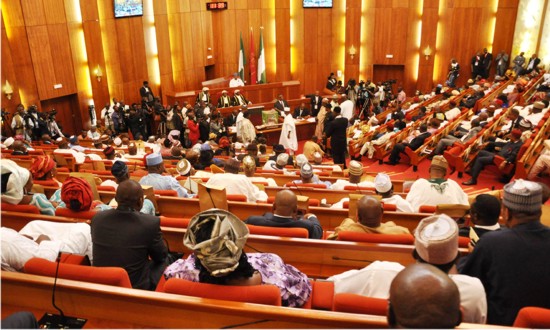As the National Assembly resumes from its three weeks of Christmas and New Year break today, the Senate has announced its preparedness to pass the 2017-2019 Medium Term Expenditure Framework (MTEF) and Fiscal Strategy Paper (FSP) this week to pave the way for deliberations on the 2017 budget.
According to information obtained from the Senate’s Order Paper last night, the upper chamber will begin the consideration of the 2017 budget next week while the MTEF has been listed on the Order Paper for passage on Thursday.
The Senate will also consider the hike in airfares along with the consideration of poor state of the airport this week.
THISDAY learnt yesterday that the Joint Senate Committee on Finance and Appropriation handling the document was tidying up legislation on the MTEF and consequently warming up to submit its report for onward consideration and eventual approval by the chamber.
Making the disclosure to THISDAY during a telephone conversation, the committee chairman, Senator John Enoh, said all things being equal, the committee would present its report on the document to the Senate this week for approval and passage.
“Well, all things being equal, we’ll submit the report. We only have one or two things to do on it. If we don’t submit it this week, we’ll do so next week,” Eno stated.
However, another source who did not want to be named, assured that the document would be ready for consideration and passage this week.
The federal government had on December 13, 2016, submitted a revised version of 2017 -2019 Medium Term Expenditure Framework (MTEF) and FSP.
In the new document, the government increased the projected N6.866 trillion 2017 budget to N7.298 trillion. It also predicated the budget on an exchange rate of N305/$, from the initial N290.
Whereas it retained the 2.2 million barrels per day oil production volume and $42.50 per barrel oil benchmark, the executive arm increased domestic borrowing projection from N1.072 trillion to N1.253 trillion.
It, however, reduced foreign borrowing under the revised MTEF from N1.336 trillion to N1.067 trillion.
It also increased aggregate capital expenditure from N1.939 trillion to N2.243 trillion and raised recurrent non-debt from N2.5 trillion to N2.629 trillion, but put its revenue target at N10 trillion. Recurrent expenditure was revised to N1.66 trillion.
The executive arm is also projecting a budget deficit of N2.3 trillion in 2017 as against N2.4 trillion in the 2016 budget.
While defending the revised document before the Joint Senate Committee on Finance and Appropriation, the Minister of Budget and National Planning, Senator Udoma Udo Udoma, said the government had opted to increase the budget projections from N6.9 trillion to N7.3 trillion because Nigeria could only end the recession if more money was pumped into the economy.
He also said the 2017 budget would be financed through an early licensing round, royalties, promissory notes, and loot recoveries.
Udoma said the federal government would award new oil licences, review the current joint venture arrangements with oil companies, marginal oil fields and mount pressure on revenue generating agencies to exceed expected targets.
According to him, of the N10 trillion revenue target, N5 trillion would be generated from the sale of crude oil, while the balance of N5.06 trillion would be generated from non-oil receipts.
He said non-oil revenue would come from corporate and company taxes, Nigeria Liquefied Natural Gas (NLNG) Company, stamp duties, capital gains tax, value added tax (VAT), customs, excise, fees, surcharges on luxury items, special levies and federal government independent revenue.
Udoma added: “I know N7 trillion seems larger than N6 trillion. But in actual dollar terms, the 2017 budget is smaller. We have had challenges in revenue generation in funding the 2016 budget, so we are trying to get to the bottom of revenue generating agencies in order to raise more money.
“On independent revenue expected from revenue generating agencies, we need to work with the National Assembly. The issue of 80 per cent of operating surplus is a problem that must be paid to the Consolidated Revenue Fund. We need to work with the National Assembly to review certain clauses of the law. We need to be more imaginative and creative in order to get out of the problem that we have with revenue generating agencies.
“We want to issue a presidential order to ensure that revenue generating agencies are unable to spend money, except the payment of salaries until their budgets are passed.
“We want to be more engaging in the Niger Delta to ensure that there is peace in order for us to produce more crude oil. We will be increasing the amount for the Amnesty Programme to the old figure. It is important to engage the people in the Niger Delta region.”
The Senate will also consider the mindless killing of innocent Nigerians in Southern Kaduna while it also plans to address the poor state of Nnamdi Azikiwe International Airport including the preponderance of obsolete equipment and flagrant cancellation or delay of flight schedule.
Thisday

